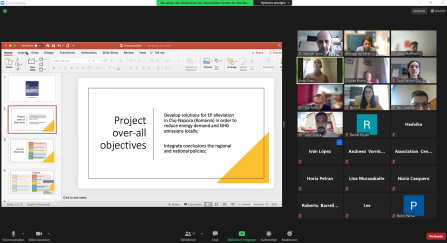Closing Workshop
| Date |
Date
|
The project team hosted a workshop to mark the end of the project where the most important findings, challenges and lessons learned were presented to an audience of experts in the field of energy poverty.
First on the agenda was Anca Sinea of the UBB presenting the lessons learned from the project and the research methodology employed. Much of the time and effort spent during this project was to gather the data needed for the scientific report. The process proved difficult as the data sources were dispersed and required a lot of engagement with the stakeholder holding the data. Furthermore, much of the data that was readily available was not in a format that could easily be used for a study. Understanding the process of the data collection, where it can be sourced from and how it can be used is of particular interest as most municipalities will have similar data and thus the process and the application of the data can be replicated across cities and municipalities.
To demonstrate one way in which the data had been applied in the project, Titus Man from the UBB’s geography department presented the interactive map and its functionalities. The attendees were able to see where indicators or energy poverty were present in the city of Cluj-Napoca. The map shows which buildings have already been renovated, where people are receiving social assistance, electricity consumption, and other relevant indicators of energy poverty.
To complement the data from the map, George Jiglau of the UBB presented the scientific report where the data collected for the map was complemented with the data from a large-scale survey of households in Cluj-Napoca. The findings showed that energy poverty is spread out across the city and is not clustered in certain areas as expected. The survey also gathered data on behavioural aspects and found that many households heat to levels above than the recommended 21oC, even among vulnerable groups. The most important findings however were that while building renovation programmes did lower bills, they were not enough to lift people out of energy poverty and income stood out, by ever metric, as the main driver of energy poverty.
A broader overview of energy poverty in Romania and Central Easter Europe was then presented by Jakob Hoffmann from adelphi. The presentation of the Policy Paper on energy poverty in Eastern Europe covered the historic development of energy poverty in the region and highlighted the particularities that make energy poverty a pervasive issue there. The policy paper also looks at energy poverty in the EU context as well as policy responses at the national and EU level.
The workshop concluded with the presenters covering the policy recommendations that have emerged from this project. There were recommendations given both for the national level, applicable across the EU, as well as recommendations specifically for Cluj-Napoca, which can also be translated to other local contexts.
The project team would like to thank everyone for attending and for the interesting discussion and valuable feedback given at the end.

